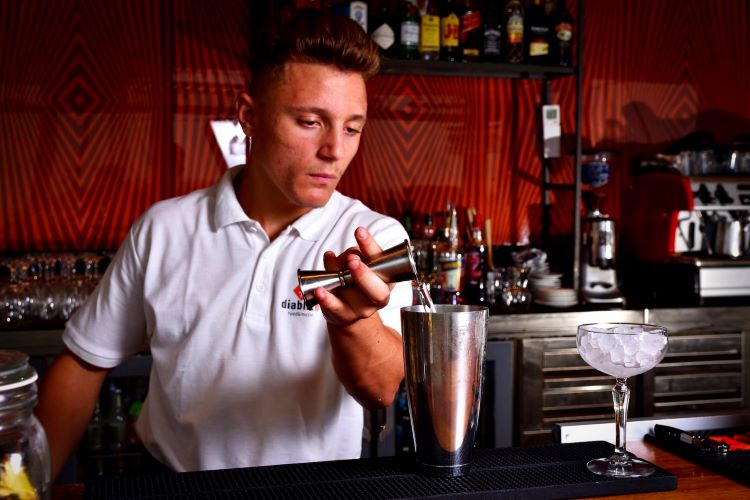One Month Alcohol-Free – What Are the Health Benefits?
There’s a lot of hype around Dry Jan, and for a good reason.
When surveyed, people who abstained from alcohol for one month reported feeling more accomplished (93%), saving money (88%), better health (70%), and more energy (67%).[1]
And the benefits don’t end there. Even after these participants went back to drinking, they continued to show improvements in their AUDIT scores, wellbeing, and ability to say no to a drink.[2]
If you’re an occasional drinker, you may begin to see the rewards straight away.
However, if you’re someone who abuses alcohol, you may feel worse before you begin to feel better.
Whether you’re trying to give up entirely, or just improve your relationship with alcohol, having a month off is always worth it.
What are Alcohol Withdrawal Symptoms?

Alcohol is a physically-addictive substance, and can cause dangerous withdrawal symptoms if you’re a heavily dependent drinker.
How severe your withdrawal symptoms are largely dependent on how much you usually drink.
What is Alcohol Withdrawal Syndrome?
Alcohol withdrawal syndrome is a condition that happens when you quit drinking after drinking heavily for a long time.
This causes the brain to become hyperexcitable, which can cause anxiety, irritability, agitation and tremors.[3]
What Happens When You Stop Drinking?

24 Hours After
The first 24 hours can be difficult, but you can get through it.
- Withdrawal symptoms usually begin
- Symptoms can start as early as 2 hours after the last drink
- Early symptoms appear like anxiety, hand tremors, sweating and headaches
- Alcohol cravings, fatigue, and depression may develop
12 to 72 Hours After
This is when the most serious withdrawal symptoms can set in, so it’s vital you speak to a doctor before detoxing if you’re a heavily dependent drinker.
- Possible severe symptoms like delirium tremens (DTs)
- Seizures
- Hallucinations
- Increased heart rate
- Increased blood pressure
48 to 72 Hours After
- Withdrawal symptoms begin to disappear for most people and positive feelings return
- DT symptoms may persist for some including disorientation, delusions, heavy sweating and high blood pressure
Between 3 and 7 Days After
- Severe DT symptoms may persist for heavy drinkers
- Others may begin to feel better
What are the Benefits of Not Drinking Alcohol?

Drinking alcohol does come with health risks, so cutting down can greatly benefit your physical and mental health.
Physical Benefits
- Clearer skin – reducing the toxins you put in your system can result in clearer and brighter skin
- Losing weight – reducing the stress and calories can help weight loss
- Better sleep – alcohol disrupts sleep, so you’ll get more rest when you cut it out
- Healthier liver – alcohol can increase the chances of liver disease, but quitting can greatly help to heal any damage you’ve done
- Improved blood pressure – quitting alcohol can reduce your blood pressure
- Lowered diabetes risk – cutting out alcohol can lower your chances of diabetes
- Lowered cholesterol – stopping drinking can lower your chances of high cholesterol
- Boosted immune system – when your body isn’t contending with the poison of alcohol, it’s stronger to fight against everyday illnesses
- Lowered risk of preventable cancer – removing alcohol from your system gives it a better chance of staying cancer-free
- More energy – better sleep means more energy
- Improved memory – your memory will be better without the intoxication of alcohol
- More hydrated – as alcohol dehydrates, you’ll be better hydrated without it[4]
What are the Mental Health Benefits of Giving up Alcohol?

As alcohol is a depressant, when you stop it can make your brain go into overdrive.
That’s why you get ‘hanxiety’ – that awful feeling of anxiety after a night out.
Quitting alcohol can set our brain back into balance, and result in more positive thoughts and feelings.
Mind advises that quitting drinking can lead to:
- Decreased suicidal thoughts
- Reduced depression
- Lowered anxiety
- A reduction in self harm
- Lowered stress[5]
Other Benefits of Not Drinking Alcohol
Aside from the many health benefits of giving up drinking, there are other benefits to your life and your wallet:
- Better relationships – drinking less can give you more quality time, fewer arguments, a chance to bond and less tension with people you love
- No hangovers – waking up with a fresh head while others are suffering from a heavy night is an extra perk
- More money – with the extra cash you save, you can do more things that bring you joy in other ways[6]
How Much Drinking is Too Much?
The NHS recommends no more than 14 units a week on a regular basis.
That’s equivalent to 6 pints of average-strength beer or 10 small glasses of lower-strength wine.
Spread your drinking over 3 or more days if you regularly exceed this.
Try to have several drink-free days each week.[7]
Other Ways to Reduce Your Alcohol Intake

- Share – opening up to friends can help to keep you accountable, and encourage you to follow through with your goal
- Prepare for triggers – if you associate certain places and people with alcohol, try to do different activities, or explain that you want to cut down
- Eat well and move more – diet and exercise can give you those feel-good emotions you’re missing
- Remember to have fun – just because you’re not drinking doesn’t mean you can’t enjoy your weekend or socialise
- Support your friends – make sure that if your friend is reducing their alcohol intake, you respect their wishes and don’t encourage drinking
The NHS has a free app you can use to track your drinking and set healthy limits.
What Can I Have Instead of an Alcoholic Beverage?
Non-alcoholic drinks can be a great alternative.
If a mocktail or alcohol look-alike feels like it may cause you to crave alcohol, stick to a drink that won’t remind you too much of the real thing.
Try having flavours that aren’t similar to ones you associate with alcoholic drinks.
What are Non-Alcoholic Beverages?

Alcohol-free beverages are drinks designed to look, smell and taste like an alcoholic drink without any of the nasty stuff.
These include:
- Mocktails
- Alcohol-free wine
- Non-alcoholic beer
- 0% spirits
You can find some mocktail recipes to try on the DrinkAware website.
What Are Some Other Tips for Staying Away from Alcohol?
- Take it slow – Alcohol Change recommends taking small steps if you feel alcohol triggers could lead to a slip
- Be selective – Don’t go places or see people that could cause feelings of wanting to have an alcoholic drink
- Stay mindful – Staying sober can help you to be more present in the moment. Connect with the feelings you experience when you’re talking to people. Studies show that accepting your emotions rather than numbing them with drink can result in better mental health[8]
- Have an exit strategy – If you decide to go to a pub or alcohol event, it’s okay to go for a walk if needed
- Create a new tradition – If you’re used to having a glass of sherry at Christmas, try having either a replacement, or a different festive drink
- Keep your hands full – When dropping a physically-addictive habit like drinking, having something to do with your hands can fill a void
- Host your own event – Hosting a sober event can give you more control over who you’ll see, triggers you’ll be confronted with
- Set clear boundaries – If people try to encourage you to have a drink, have a pre-prepared excuse as to why you’re not drinking
Where Can I Find Help for Alcohol Use Disorder?
Make an appointment with your GP. They’ll be able to recommend recovery groups in your local area.
These non-profit organisations offer free alcohol guidance for you and your friends and family:
- Al-Anon Family Groups – support for family members
- Alcoholics Anonymous (AA) – 12-step support for people addicted to alcohol
- SMART Recovery – diagnosis help, motivational help, tools and coping strategies
- Adfam – online forum support and local recovery groups
- Change Grow Live – advice and resources for drug and alcohol recovery
- We Are with You – meetings and information for recovery from drugs and alcohol
- National Association for Children of Alcoholics (NACOA) – confidential phone and email support for children of alcoholic parents
The NHS website also has free resources and useful links to alcohol recovery support.
How Do I Know if I Need to Go to Rehab?
According to NHS guidelines, you may have an addiction if:
- Your drinking causes harm in your life
- You often a strong urge to have a drink
- Other people warn you about how much you’re drinking
- You think your drinking is causing you issues[9]
What is Rehab for Alcohol Use Disorder?
Inpatient Rehab
Inpatient rehab is a residential treatment facility for addiction where you live at your facility.
This means you get 24/7 treatment and security as you go through detox and therapy.
Residential rehab is private, but funding is available on the NHS through a referral.
Outpatient Rehab
Outpatient rehab is when you live at home, and receive treatment from a rehab facility.
This can give you the flexibility to continue providing childcare, or continue your job.
Outpatient rehab can also be funded by the NHS or your insurance provider.
How can I Get a Rehab Referral?
At Rehab Recovery, you can get completely free and referrals to top rehabs.
For more information about rehab for alcoholism, call our 24/7, confidential hotline on 0800 088 66 86.
References
[2] https://alcoholchange.org.uk/blog/dry-january-the-evidence
[3] https://www.aafp.org/pubs/afp/issues/2004/0315/p1443.html/1000
[7] https://www.nhs.uk/live-well/alcohol-advice/calculating-alcohol-units/




